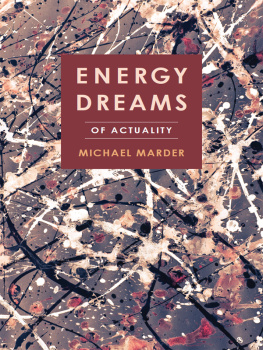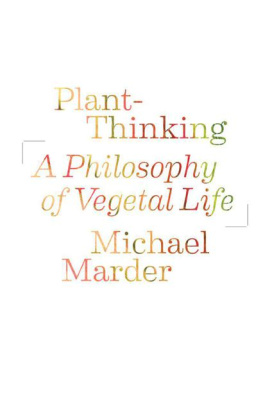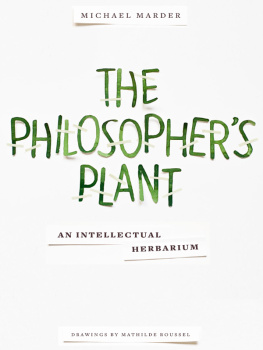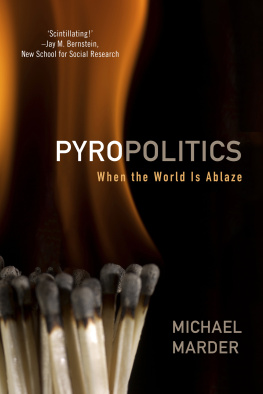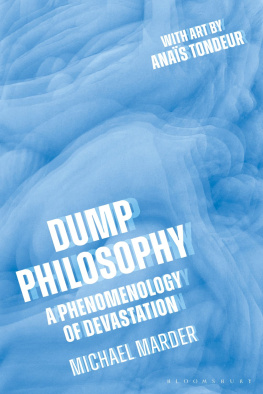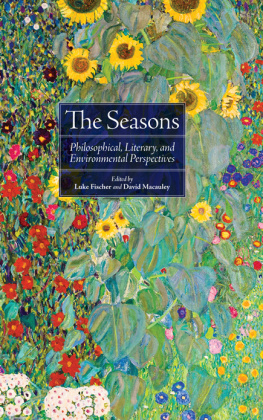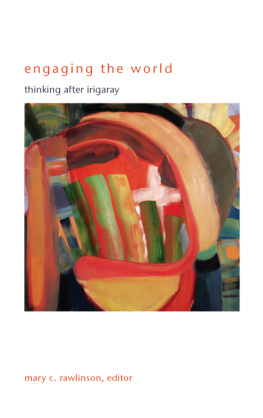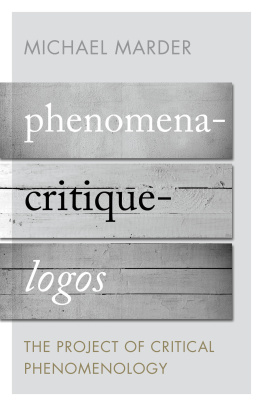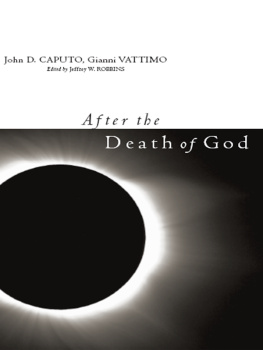Table of Contents
ENERGY DREAMS
ENERGY DREAMS
OF ACTUALITY
MICHAEL MARDER
Columbia University Press
New York

Columbia University Press
Publishers Since 1893
New York Chichester, West Sussex
cup.columbia.edu
Copyright 2017 Columbia University Press
All rights reserved
E-ISBN 978-0-231-54283-8
Library of Congress Cataloging-in-Publication Data
Names: Marder, Michael, 1980- author.
Title: Energy dreams: of actuality / Michael Marder.
Description: New York: Columbia University Press, 2017. | Includes bibliographical references and index.
Identifiers: LCCN 2016035594| ISBN 9780231180580 (cloth: alk. paper) | ISBN 9780231180597 (pbk.: alk. paper) | ISBN 9780231542838 (e-book)
Subjects: LCSH: Psychic energy (Psychoanalysis) | Power (Social sciences) | Political sciencePhilosophy.
Classification: LCC BF175.5.P72 M37 2017 | DDC 118dc23
LC record available at https://lccn.loc.gov/2016035594
A Columbia University Press E-book.
CUP would be pleased to hear about your reading experience with this e-book at .
Jacket design: Milenda Nan Ok Lee
FOR PATRCIA, WITH THE ENERGY OF LOVE
LAMOR CHE MOVE IL SOLE E LALTRE STELLE
DANTE, PARADISO XXXIII, 145
CONTENTS
M uch of my work in political philosophy has been preoccupied with the existential energy boiling under or extinguished in the structures of the state, among other institutions, and in the conduct of informal political actors. In Pyropolitics I isolated the element of fire that supplied the energy necessary to the conflagrations of revolt and to the calmer, steadier, more controlled flames housed in various political kitchens. As I developed this line of thinking, it quickly became apparent that a fiery constitution of reality, rather than being limited to a single sphere of human activity, applied to our epoch as a whole. The world is burning and, in its blazing finitude, is reducing itself to smoldering ashes. Postmodern nihilism, global climate change, fracking and oil extraction from the ocean floor, the triumph of technocracy and the cooling of the political willall these are the ramifications of the nearly extinguished pyrological blueprint of reality first furnished by metaphysics eons ago.
The ink had not yet dried on the closing lines of that book and a new and fairly urgent task presented itself, namely to galvanize an alternative, nonviolent framework for thinking about and practically relating to energy without destroying living beings and our planet through its extraction. The scope of such a project could no longer be circumscribed by politics, however broad its conception; it had to be expanded so as to account for our ontological presuppositions, theological aspirations, economic pursuits, psychological self-conceptions, and scientific worldviews. I sought the foundations for an unconventional energy model in the realm of vegetal life, with which I am intimately familiar. As I had noticed in my previous investigations, the energy plants derive from the sun in the process of photosynthesis is nondestructive, world-preserving, and essentially superficial. Could it be that our stubborn denigration of all things vegetal was in collusion with the desire to burn everything and everyone, instead of receiving the bountiful energy of the solar blaze in the manner of vegetation? If so, then we must learn from plants how to live a more ethical life, respectful of the others claim to existence and operating with a drastically different energy than the one we are accustomed to. The locution green energy would need to acquire a literal sense to be truly meaningful.
Although vegetal life winds as a guiding thread through Energy Dreams, it is only one entry point into the nonviolent paradigm I seek. Other heterogeneous filaments tied with it in the same knot include Aristotles notion of energeia as the fullness of actuality, later on taken up by Hegel in his conception of Wirklichkeit; the hesychastic spiritual practice of stillness that resonates with ashtanga yoga; nonproductivist accounts of divine creation and human work bordering on play; inoperative communities; object-cathexes and what lies beyond the pleasure principle; powerless power and a certain version of perpetual peace; the rescue of matter by quantum physics from its traditional role as a passive substratum for form and action
Inexorably, the thinking of energy will take us back to the roots of Western philosophy, the birth of the concept in Aristotle and its permutations in the millennia after him. Even now, in the twenty-first century, whenever we say the word, we speak in Greek, but its early connotations have become Greek to us. We associate energy with something to be burned, hoarded, or wasted without any clear end, indispensable yet also unidentifiable except by enumerating the resources that contain it. My suggestion is to search for clues to our current confusion and for alternatives to burning the world in the deep past of the concept and the thing, a past that may turn out to be the most radical (and the only) future a living planet can have, namely that of energetic rest, of energy as rest and accomplishment.
It is my hope that, in the course of perusing this book, the reader will experience a visceral need, a thirst or a hunger for another energy, irreconcilable with the destructive-extractive procurement of potentiality, power, or force lacking an inherent end. I invite those who pursue not only alternative sources of energy but, before all else, alternative energy as such, to dream with me about its advent. And let us not hurry to label these dreams utopian in the face of the harsh reality surrounding us today. We will have plenty of occasions to decide what falls on the side of actuality: the dominant ideology, bent on extracting the last drop of energy from everything and everyone, or the dream of energetic existence that cares for and preserves both beings and being itself.
E nergy Dreamsthe title came to me all of a sudden, as they say out of the blue, when I least expected it. It surprised me and, just as swiftly, energized my thought and swathed me in its opacities.
Who dreams, and about what, when energy dreams? Is energy the subject here? Or the desired object of a fantasy? Is dreams a noun in the plural? Or a verb in present tense, third-person singular? Or, perhaps, both at once? Does energy dream in us, as us, through us? Does it, by so sweeping us off our feet and into its vortex, promote its own increase, its insatiable growth? Is it horrified, if not paralyzed, by the sense of its dwindling? Is it forgetting that, regardless of its peregrinations, it will be conserved, in accordance with the first law of thermodynamics? Or is its reverie one of fullness, completion, and accomplishment outside the instrumental rationality of means-and-ends, which has mutated into the logic of means-as-ends?
These are not idle questions that personify a nonhuman concept, now replete with a strangely subjective figuration. Resonating in them is the crisis of energy (which is not the same thing as an energy crisis), more serious still than the energy worries that have been a part of our lexicon and daily life at least since the 1970s. A salient grammatical expression of the crisis is the equivocation between the verb and the noun we have witnessed in the title of this chapter and of the book as a whole. By force of habit, we think of energy as a resourcea thought not so outlandish considering that, as a word, it is a substantive. A noun, an object, a cause for wars and diplomatic alliances, something to divide, extract, lay claim to, possess. So irresistibly seductive is the grammatical and ontological substantivization of energy that it undercuts our appreciation of its meaning: we begin with different types of fuel or power (carbon and oil, solar and hydro) and generalize until we reach a poorly understood and reliably unquestioned umbrella term. The effects of energy, however, surpass a strife-ridden or consensual division of resources. Far from a mere object to be appropriated, it energizes usour bodies, psyches, economies, technologies, political systemsIts sense, then, is evenly split between substantive and verbal significations. The will to energy is none other than the will to willing, where the object, the objective, is not some inert material but an active, activating eventthat of the subject. The crisis of energy is that, though treated as a finite resource to be seized in a mad race with others who also desire it,




